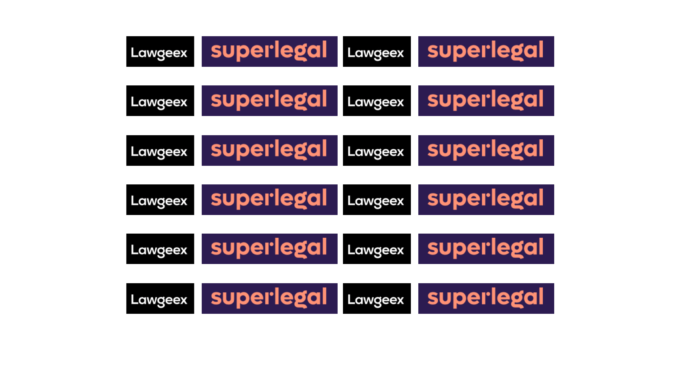
Contract review pioneer, LawGeex, has split its business into two parts, the existing brand for large companies and a new entity for small ones: Superlegal. Artificial Lawyer spoke to CEO Noory Bechor about the changes that will see around one third of staff leave (see interview below).
First, some context. LawGeex has a special place in legal tech as it was arguably one of the first ‘legal AI’ startups and got going in Israel in around 2014 based on the idea that using NLP you could quickly help people to review contracts and highlight issues they needed to be aware of.
The initial hope had been that the technology alone would do nearly all of the work. Also, at the start the idea was also to appeal to smaller businesses, even very small ones, as well as any larger companies they could win as clients.
As time went by more corporates bought into what LawGeex could do – but they also wanted the company to do more of the ‘leg-work’ and make sure the review was as good as could be. That meant getting involved in a more consultative approach and bringing in more people to do quality checking. They also developed an offering to help corporates with playbooks – and this has been helped via Utah where they have a special licence (see below) so they can do this work, which is a regulated activity in the US.
However, one of the bugbears for all ‘legal AI’ companies, especially those where very high accuracy levels are expected, is the need to provide additional human input for the client. Software companies want to be software companies. Software, ideally, is very scalable. Investors like it because of this. But, if you have a team of lawyers inside the business, then this is less easy to scale, as you are selling services AND software.
Law firms can sell 99.5% legal services and some software and it doesn’t affect their model. For a software company with a notable amount of service provision, this changes the model a lot.
One could argue that what is happening is both a rationalisation of this challenge and also in the shape of Superlegal a rebirth of the original idea: a light-touch NLP solution for those that need a rapid analysis of contracts they’ve received, but without a lot of the additional service element. I.e. an SME may be happy to have some key risks in a contract highlighted by Superlegal (via LawGeex’s now very well-trained NLP), whereas the big corporate clients still want the full works with human quality checkers, and perhaps help with playbooks.
So, two businesses, but essentially offering the same thing: contract review, but one ‘lite’ and the other ‘full-fat’.
And it’s worth saying that LawGeex is not the only legal tech company to experience this challenge. Buyers want complete solutions. Some legal tech solutions are inherently incomplete and demand the buyer finish things off by themselves. That can create challenges.
Last point before the interview: funding. If you take VC money you have to grow – and fast. In April 2020, at a time of buoyant software company valuations, they received $20m. As you can guess, more funding is likely necessary fairly soon – but market conditions are not great at present. So that has to also be taken into account especially with regard to the job losses – see last comment by Bechor (pictured below). That said, Bechor also notes below that the enterprise part of the business, i.e. LawGeex of today, is profitable and won’t be ‘dependent’ on fresh VC funding. So, perhaps the way to see this is more about shifting the growth capital focus to Superlegal, while letting the enterprise part, LawGeex, tick over without lots of fresh funding. We will see.

– Where have you downsized? Why?
As you know last year, LawGeex became the first AI company in the world to receive a licence to practice law from the Supreme Court in the State of Utah. This tectonic change in the legislative environment created an amazing opportunity for us to bring the Lawgeex award winning AI technology to a much bigger market and transition from only selling to enterprise in-house legal teams to helping essentially all companies with legal needs.
Given the dozens of customers that have already signed-up and are actively using Superlegal in the few months since it has emerged from stealth mode, it is quite clear that the platform has found the ideal product market shift which has warranted a shift in resources on the part of the company to support this hyper growth offering.
As a result of the restructure, we will now have two independent business units – LawGeex which focuses on enterprise in-house legal teams and Superlegal which focuses on smaller companies without an in-house team.
Like everyone else we have been following what’s happening in the public and private markets over the last months and reached the conclusion that we need to prepare our company for the future. We are fortunate to have a mature product and a large book of business of enterprise customers. These allowed us to move the enterprise business into profitability so it will no longer be dependent on external capital fundraising.
As opposed to the enterprise business unit, Superlegal is a young startup and we definitely expect to raise additional capital for it in the future and are already seeing very strong demand from investors. In the meantime, we need to operate it in a capital efficient way since currently investors pay special attention to financial metrics, even from an early stage in the company’s lifecycle.
The reductions have been across the company and in all locations. Our guiding principle was to ensure that we continue to deliver the high quality solutions which LawGeex is known for while running the business in a more capital efficient way.
–How many people are leaving?
We are still in the process so I can’t provide exact numbers at this point, we estimate it will be about a third of the team. (LinkedIn shows around 105 staff at present.)
– What will happen to the Utah office? And also your special legal licence there?
We are keeping the Utah office to support both our enterprise clients and Superlegal clients and plan to continue expanding it as demand for our solutions continues to grow.
– Will you still do playbooks for clients?
Of course. Our enterprise offering is not going to change.
– Is this about getting rid of your ‘consultancy’ approach so you can be a pure software company that is more scaleable? (And if so, isn’t this like a return to your original model?)
Same as above. We have a lot of happy customers who rely on our solution as a mission critical piece of their legal and business operation. We will continue offering the same level of high quality enterprise-grade solution without any change to the delivery model.
– Did the investors put pressure on you to do this?
Our investors are highly engaged and help us with our strategic planning. Given the huge opportunity with Superlegal and the changing macro environment, it was clear that this is the right decision.
—
So there you go. As noted above, for this site, the reality is that this is primarily about fitting a product to your market. In LawGeex’s case they have two markets and two products, one for large inhouse teams that want ‘the full works’, and also SMEs that just want some quick help. It makes total sense to have two separately branded products with some differences in approach.
In fact, several other legal tech companies in the market today would probably benefit from taking a similar ‘lite’ version strategy to sell alongside their main product.
The current market conditions for VC funding have also likely not helped here in terms of the job losses. But it would be wrong to assume these job losses are something terminal for LawGeex, rather this restructure may allow it to prosper for a long time to come.
1 Trackback / Pingback
Comments are closed.